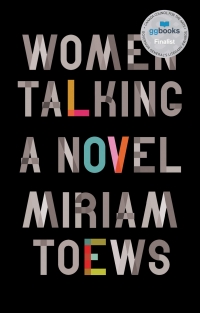Women Talking by Miriam Toews
 Friday, April 5, 2019 at 9:48AM
Friday, April 5, 2019 at 9:48AM 
Published by Bloomsbury Publishing on April 2, 2019
Women Talking is set in the imaginary Molotschna Colony in Bolivia, but the story is based on the real Manitoba Colony, where Mennonite women were drugged and raped over a period of years, their stories of waking up in pain dismissed as female fantasies or believed to be the work of demons who punished the women for their sins. The actual demons were several men in the colony, some of whom were related to the women they raped.
The novel posits that three hundred women were sprayed with an anesthetic used on farm animals and raped by eight men. A woman named Salome tried to kill them with a scythe, prompting the elders to have the men arrested for their own safety. Their families posted bail and they will now be returned, but what will the women do when they come back?
When the crimes were discovered, the perpetrators are jailed for their own safety, lest the women hack them to pieces with a scythe. As the men in the colony set about raising bail money for eight rapists, the women hold a meeting. The (male) elders have given the women the option of forgiving the men, thus assuring their place in Heaven, or leaving the colony and entering a world about which they know nothing, a prospect made more difficult by their illiteracy and unfamiliarity with any language except that spoken exclusively by Mennonites.
The women make their choice during a two-day discussion. The minutes are taken by August Epps, who gained an education after his family was excommunicated. Epps later returned and is seen by some as having his uses, although his lack of farming skills renders him useless in the eyes of most colonists.
The novel imagines how the women would discuss their difficult choice. They consider whether forgiveness is possible and whether there might be some sins so weighty that only God, and certainly not the victims, can be expected to forgive them. The women are expected to be obedient to their husbands, but since they have not been taught to read the Bible, they are no longer certain that obedience is actually something their faith commands. Perhaps the religion emphasizes love rather than obedience; they can’t be sure.
Most of the women have rejected the forgiveness option, and are now deciding whether they should leave or stay to fight their oppressors. But fighting — if the fight involves physical violence — would require them to violate the pacifist beliefs that are central to their religion. Still, a fight for gender equality need not be violent; the revolution could be bloodless.
If the women decide to leave, what impact will that decision have on the colony’s men, who might not all be inherently evil despite the “pernicious ideology that has been allowed to take hold of their hearts and minds.” Some suggest that they take the younger boys with them and teach them not to be rapists.
The story generates drama and suspense as, on the second day, the reader wonders whether the women will actually abandon the colony and their older children and go forward into a world they are ill-equipped to understand. There is also tension in Epps’ personal story. Perhaps listening to brave women discuss their futures will have an impact on Epps’ fate.
These are heavy discussions but Miriam Toews lightens the mood with digressions and gossip and personality clashes. Women Talking is smart, sad, funny, completely engaging, and remarkably original.
RECOMMENDED
Reader Comments